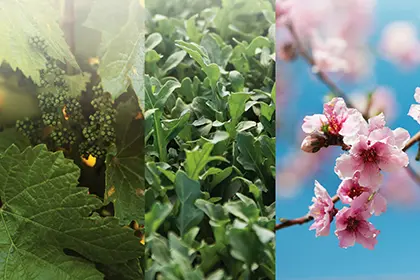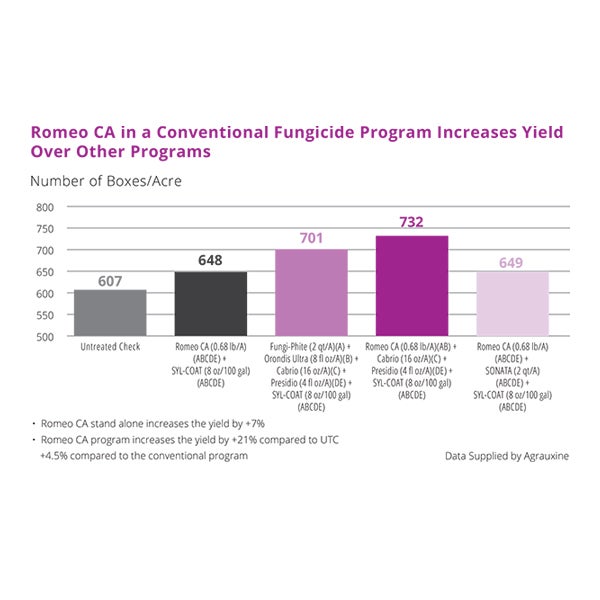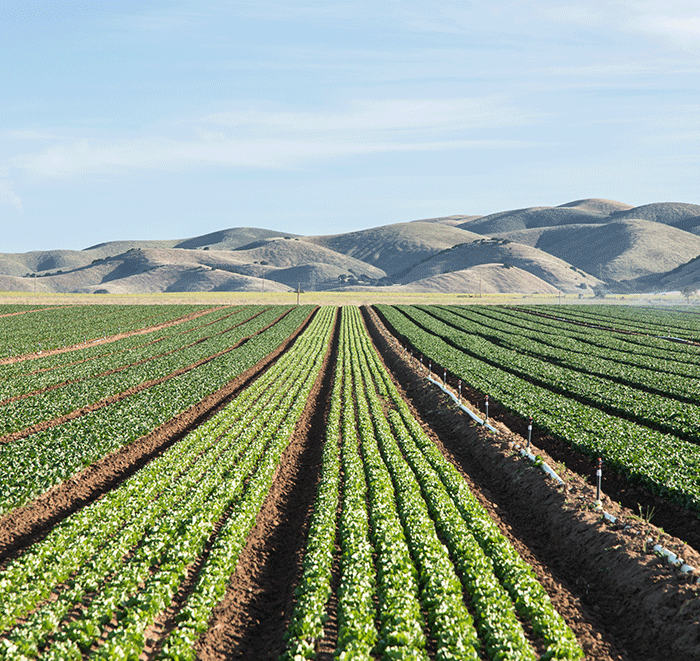
Biofungicides offer natural option for effective disease control, with IPM benefits
Biofungicides offer natural option for effective disease control, with IPM benefits
Everyday growers and agribusinesses alike face pressures regarding sustainable farming, regulatory policies and more. As the industry collectively seeks ways to advance the effectiveness of pest control tools, enhance production, minimize environmental impact and maximize return, biologicals have emerged as a promising solution.
“Biologicals complement existing crop protection products by integrating living or naturally occurring substances in an integrated pest management (IPM) program,” said Wilbur-Ellis Agronomist, Brooks Craven. “They can also be paired with current farming practices as an enhancement to effectively protect plants from disease, insect pests and weeds.”
At Wilbur-Ellis, biofungicides are a growing segment of the company’s portfolio. By offering a unique mode of action, enhanced rotational resistance management and a zero-day preharvest interval (PHI), our biofungicides help growers protect their crop from disease with an eye toward prolonging the efficacy of all their fungicide choices.
“Biofungicides enhance conventional control methods when used in an IPM strategy by offering a more holistic approach to maximize yield and minimize disease resistance,” said Craven. “A biofungicide like Romeo CA, for example, will stimulate the plant’s natural defense mechanisms to help strengthen the plant against future fungal attacks as a preventative.” Other biological products can fight pests directly or colonize the roots of plants to act as a barrier against pests.
“Most importantly, biofungicides deliver the value and efficacy growers need in the field to make a difference on their bottom line,” Craven said. “As increasing environmental and chemical restrictions have resulted in the loss of many important chemistries, biologicals give growers more options to manage resistance against diseases and pests—at a reasonable cost.”
Example of a powerful biofungicide: Romeo CA.
Romeo CA is a preventive biofungicide available exclusively in California to Wilbur-Ellis for conventional and organic tree fruit, tree nut, vine and vegetable cropping systems. The product’s yeast-based active ingredient is nonliving and contains five constituents that each uniquely and individually contribute to disease control while supporting growers who are interested in minimizing residue on the crop and enhancing their resistance management and IPM programs.
“In a region where growers often face increased humidity, rain and soil moisture, Romeo CA stands out as a superior foliar treatment for powdery mildew and downy mildew in almonds, grapes, cucurbits and leafy greens—as well as brown rot blossom blight in almonds,” said Craven. “The proof is in the data.”
Proven efficacy enhances grower profitability.
Trials with California leafy green growers demonstrate that Romeo CA increases yield over other programs in a conventional fungicide program and reduces disease incidence in both conventional and organic programs. Similarly, trials with California almond and grape growers show that Romeo CA improves efficacy of conventional fungicide programs.

With Romeo CA, preventive treatment following label directions is key. Romeo CA is approved for use in both organic and conventional production and has a spray interval of 10-14 days, depending on the disease pressure. Specific application recommendations for labeled crops include the following:
- Conventional and organic almond production: One application at pink bud is necessary. Depending on brown rot blossom blight pressure, growers may apply one or two more times through bloom.
- Conventional grape production: Two or three early applications at shoot growth and/or bloom are strongly recommended.
Organic grape market: Applications can be made in tandem with Sulfur Dry Flowable or another biofungicide like SONATA®, which supports late-season disease issues right up until harvest, is advised.
- Conventional and organic leafy green production: Partner Romeo CA in a high-pressure tank mix or in alternation (low pressure) with conventional products during leaf development and re-apply before harvest to ensure a clean crop.
Background: What exactly are biofungicides?
Biofungicides are naturally based microbial or biochemical products, meaning they contain beneficial microorganisms as the active ingredient—usually bacteria or fungi found in root, soil and foliar environments. Biofungicides can induce resistance to a wide range of diseases in a variety of plants and can further support plant growth promotion and improve nutrient uptake.
Alongside bioherbicides and bioinsecticides, biofungicides make up part of the growing biological crop protection segmentdesigned to support more natural solutions that enhance production and environmental health while meeting increasing consumer demand for sustainably grown food.
Further, biofungicides can enhance the performance of synthetic products. They leave few or no residues and can be an important part of an integrated pest management (IPM) program when used properly and proactively.
So, why biofungicides?
Biofungicides deliver a proven approach to help reduce the damage caused by diseases and pests with positive impacts to the grower’s bottom line as well as the environment. Unique benefits include the following:
- Increased ROI: Highly efficacious, biofungicides can allow growers to sell their produce at a premium price when compared to conventional chemical production.
- Low or no residue: Because biofungicides are often exempt from Maximum Residue Limits (MRLs), they help growers manage the demands from food retailers and consumers.
- Enhanced resistance management: Biofungicides help combat resistance and reduce inputs when used with conventional crop protection. Most can also be used in organic production.
- Complements other chemistries: Improved plant function enables tank mixed chemistries to perform better.
- IPM support and minimal impact to beneficial insects: Selective chemistries are targeted to specific pests, meaning enhanced safety for beneficial insects.
- Reduces environmental impact: Biofungicides help preserve soil and water quality resulting from less active ingredient in the environment and a shorter residual.
- Extended application window and flexibility: Given short pre-harvest intervals (PHIs), biofungicides offer growers application flexibility and convenience. Products can be applied throughout the season and support better maintenance of harvest and shipping schedules.
- Rainfast when dry.
Local support
Trained agronomists and certified crop advisors are armed with the data and expertise to demonstrate biological efficacy and to support growers with implementation.
“At Wilbur-Ellis, our Research and Development teams combine years of training and expertise with the latest trials and technologies to develop and vet sustainable solutions for our growers’ fields and orchards,” said Craven. “As agronomists, we’re excited to bring that knowledge to the grower to help them enhance their farm production and returns.”
Wilbur-Ellis first launched Romeo in 2018. Romeo CA received registration in the fall of 2022, and 2023 is its first launch year. The company offers a complete line of agricultural inputs, including crop protection chemicals, organic and sustainable options, fertilizer, seed and technology. Growers interested in learning more about Romeo and Romeo CA are encouraged to visit their local retailer.

